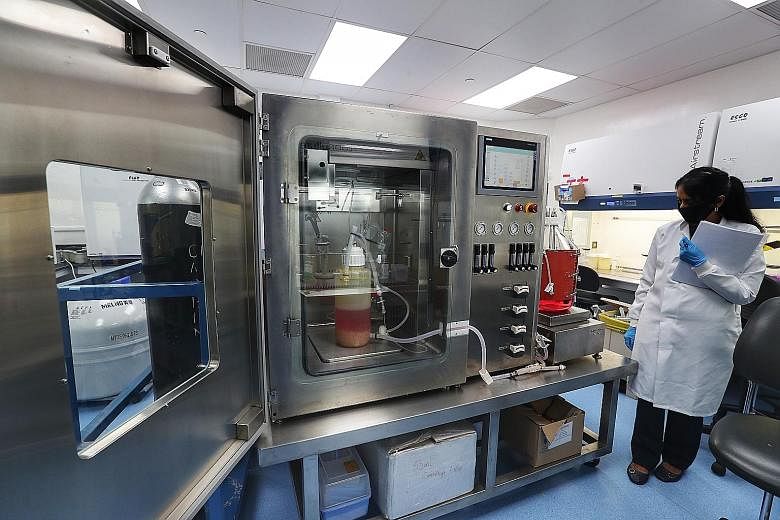A team of local researchers is working on a Covid-19 vaccine that can be modified within three weeks to tackle the Sars-CoV-2 virus if it mutates, and they are hoping for human trials within six months.
Home-grown Esco Aster is developing the vaccine with United States biotechnology company Vivaldi Biosciences, tapping chimeric vaccines which are created by merging proteins from different viruses.
The work-in-progress vaccine, currently named Esco Aster DeltaCov, was "constructed" by joining antigens from the Sars-CoV-2 virus - which causes Covid-19 - with a protein "backbone" from the flu virus.
Antigens are molecules capable of stimulating an immune response.
"Viruses actually want to lie low and not be recognised - they want to evade the immune system and not cause any response.
"By having this backbone... we can awaken the immune system to realise there's a novel virus and create the antibodies needed to kill it," Esco Aster's chief executive Lin Xiangliang told The Straits Times.
Esco Aster, which has a laboratory in Ayer Rajah Crescent, offers vaccine-, cell-and gene-therapy development and biomanufacturing services.
Research on the flu virus backbone was started in 1999 by Dr Thomas Muster, who is now Vivaldi Biosciences' chief scientific officer.
It has been used to create vaccines and vaccine candidates for several infectious diseases since then, including multiple flu strains and the severe acute respiratory syndrome or Sars, also a coronavirus.
Mr Lin had approached Vivaldi Biosciences after the first Covid-19 case in Singapore was confirmed on Jan 23.
Esco Aster, an arm of leading biopharma equipment manufacturer Esco Group, is working on finding the correct antigen sequence to be inserted into the backbone, and on scaling up the production of the backbone.
-
S'pore's search for a vaccine
-
Scientists around the world are rushing to produce a Covid-19 vaccine, and there could eventually be several different ones on the market. Researchers in Singapore, working with overseas players, are part of this effort.
Mr Lin said the company can do both tasks through the use of a special bioreactor it previously helped to develop, which cultivates cells and the virus in conditions which simulate that of the human lung.
He added that Esco Aster will also mass-produce the vaccine when it is ready, and will be able to ramp up production fairly quickly if necessary.
Meanwhile, Vivaldi Biosciences, which develops flu vaccines, is handling the process necessary to connect the Sars-CoV-2 antigen with the protein backbone, also known as reverse genetics.
Esco Aster's senior bioprocess scientist (vaccine development), Dr Nandini Prabhakar, said the use of the backbone allows the company to accelerate the development of its vaccine, as the backbone has already been established to be safe.
This will also allow the company to produce a new vaccine within two to three weeks should Sars-CoV-2 mutate, as it will be a matter of simply "switching" the current virus antigens with those of the new virus strain.
Once ready, the vaccine can be delivered into a patient's body via nasal spray, mimicking the natural way its component viruses would infect a person.
The Sars-CoV-2 antigen will be detected by the immune system, which will activate white blood cells to produce antibodies to fight it and learn to "recognise" the virus so the body can combat it should a future infection occur.
Dr Nandini said her team aims to begin animal testing in about two to three months, and hopes to have the vaccine, which will also work on flu viruses, ready for human studies within the next six months.












